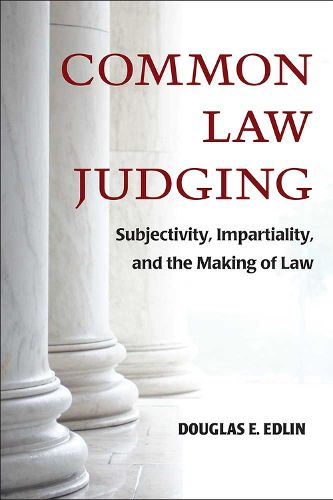Readings Newsletter
Become a Readings Member to make your shopping experience even easier.
Sign in or sign up for free!
You’re not far away from qualifying for FREE standard shipping within Australia
You’ve qualified for FREE standard shipping within Australia
The cart is loading…






Are judges supposed to be objective? Citizens, scholars, and legalprofessionals commonly assume that subjectivity and objectivity areopposites, with the corollary that subjectivity is a vice and objectivity is avirtue. These assumptions underlie passionate debates over adherenceto original intent and judicial activism.
In Common Law Judging, Douglas Edlin challenges these widely heldassumptions by reorienting the entire discussion. Rather than analyzejudging in terms of objectivity and truth, he argues that we shouldinstead approach the role of a judge’s individual perspective in terms ofintersubjectivity and validity. Drawing upon Kantian aesthetic theory aswell as case law, legal theory, and constitutional theory, Edlin develops anew conceptual framework for the respective roles of the individual judgeand of the judiciary as an institution, as well as the relationship betweenthem, as integral parts of the broader legal and political community.Specifically, Edlin situates a judge’s subjective responses within a formof legal reasoning and reflective judgment that must be communicated todifferent audiences.
Edlin concludes that the individual values and perspectives of judgesare indispensable both to their judgments in specific cases and to theindependence of the courts. According to the common law tradition,judicial subjectivity is a virtue, not a vice.
$9.00 standard shipping within Australia
FREE standard shipping within Australia for orders over $100.00
Express & International shipping calculated at checkout
Are judges supposed to be objective? Citizens, scholars, and legalprofessionals commonly assume that subjectivity and objectivity areopposites, with the corollary that subjectivity is a vice and objectivity is avirtue. These assumptions underlie passionate debates over adherenceto original intent and judicial activism.
In Common Law Judging, Douglas Edlin challenges these widely heldassumptions by reorienting the entire discussion. Rather than analyzejudging in terms of objectivity and truth, he argues that we shouldinstead approach the role of a judge’s individual perspective in terms ofintersubjectivity and validity. Drawing upon Kantian aesthetic theory aswell as case law, legal theory, and constitutional theory, Edlin develops anew conceptual framework for the respective roles of the individual judgeand of the judiciary as an institution, as well as the relationship betweenthem, as integral parts of the broader legal and political community.Specifically, Edlin situates a judge’s subjective responses within a formof legal reasoning and reflective judgment that must be communicated todifferent audiences.
Edlin concludes that the individual values and perspectives of judgesare indispensable both to their judgments in specific cases and to theindependence of the courts. According to the common law tradition,judicial subjectivity is a virtue, not a vice.